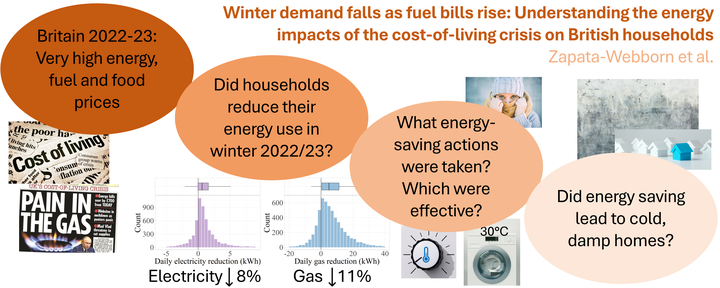Winter demand falls as fuel bills rise: Understanding the energy impacts of the cost-of-living crisis on British households

Abstract
In October 2022 British households entered a heating season amidst exceptionally high energy prices – squeezing household incomes and increasing fuel poverty. This study analyses electricity and gas consumption in 5594 households from October 2022 to March 2023 using XGBoost counterfactual models trained on historic data. With survey data collected in early 2023 we investigate how consumption reduction correlated with energy-saving actions, household and dwelling characteristics, and indicators of underheating and fuel poverty. Our analysis showed that electricity consumption was 8.4% lower and gas consumption 10.8% lower than the previous winter (accounting for weather), saving consumers around £29/month. Despite this and a government subsidy, energy bills were still around £34/month higher than the previous winter (£158/month (median); £500/month (95th percentile)); price elasticity was −0.10 for electricity and −0.07 for gas consumption. Greatest consumption reduction correlated with largest reported changes to heating practices, in particular heating for fewer hours and turning thermostats down lower. We find evidence of greater fuel poverty and underheating among the greatest energy reducers. This paper presents novel methods for analysing energy saving using smart meter data for changes without a control group, plus novel findings related to short-term price elasticity and the energy-saving impacts of behaviour change.